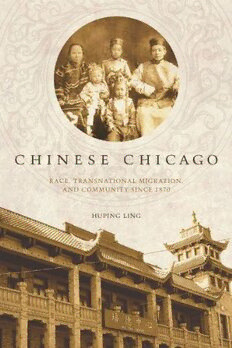
Chinese Chicago: Race, Transnational Migration, and Community Since 1870 PDF
Preview Chinese Chicago: Race, Transnational Migration, and Community Since 1870
Chinese Chicago asian america A series edited by Gordon H. Chang The increasing size and diversity of the Asian American population, its growing significance in American society and culture, and the expanded appreciation, both popular and scholarly, of the importance of Asian Americans in the country’s present and past—all these developments have converged to stimulate wide interest in scholarly work on topics related to the Asian American experience. The general recognition of the pivotal role that race and ethnicity have played in American life, and in relations between the United States and other countries, has also fostered the height- ened attention. Although Asian Americans were a subject of serious inquiry in the late nineteenth and early twentieth centuries, they were subsequently ignored by the mainstream scholarly community for several decades. In recent years, however, this neglect has ended, with an increasing number of writ- ers examining a good many aspects of Asian American life and culture. Moreover, many students of American society are recognizing that the study of issues related to Asian America speaks to, and may be essential for, many current discussions on the part of the informed public and various scholarly communities. The Stanford series on Asian America seeks to address these interests. The series will include works from the humanities and social sciences, including history, anthropology, political science, American studies, law, literary criticism, sociology, and interdisciplinary and policy studies. A full list of titles in the Asian America series can be found online at www.sup.org/asianamerica Chinese Chicago race, transnational migration, and community since 1870 Huping Ling stanford university press stanford, california Stanford University Press Stanford, California © 2012 by the Board of Trustees of the Leland Stanford Junior University. All rights reserved. No part of this book may be reproduced or transmitted in any form or by any means, electronic or mechanical, including photocopying and recording, or in any information storage or retrieval system without the prior written permission of Stanford University Press. Printed in the United States of America on acid-free, archival-quality paper Library of Congress Cataloging-in-Publication Data Ling, Huping, 1956– author. Chinese Chicago: race, transnational migration, and community since 1870 / Huping Ling. pages cm. — (Asian America) Includes bibliographical references and index. isbn 978-0-8047-7558-8 (cloth : alk. paper) — isbn 978-0-8047-7559-5 (pbk. : alk. paper) 1. Chinese Americans—Illinois—Chicago—History—19th century. 2. Chinese Americans—Illinois—Chicago—History—20th century. 3. Chicago (Ill.)—Emigration and immigration—Social aspects. 4. Chicago (Ill.)—History—1875– 5. Transnationalism. I. Title. II. Series: Asian America. f548.9.c5l56 2012 305.8951'073077311—dc22 2011014089 Typeset by Bruce Lundquist in 11/14 Adobe Garamond To Paul C. P. Siu whose work inspired this book Contents List of Illustrations xi Acknowledgments xiii A Note on Translation and Terminology xvii Introduction: Rethinking Chinese Chicago 1 1. Searching for Roots of a Transnational Community 12 2. Locating China town, 1870s–1910s 24 3. Operating Transnational Businesses, 1880s–1930s 58 4. Living Transnational Lives, 1880s–1930s 98 5. Bridging the Two Worlds: Community Organizations, 1870s–1945 132 6. Connecting the Two Worlds: Chinese Students and Intellectuals, 1920s–2010s 172 7. Diverging and Converging Transnational Communities, 1945–2010s 205 Epilogue: The “Hollow Center Phenomenon” and the Future of Transnational Migration 242 Notes 249 Bibliography 279 Index 307
